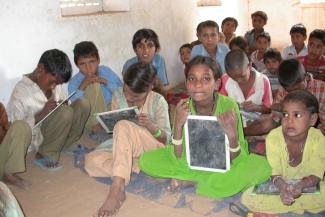Terre des hommes
Global collective

The evaluation was done by a political scientist from the University of Kassel. Fifteen persons from project regions – core staff as well as unpaid volunteers – were questioned in qualitative interviews. The majority appreciated the TDH model and said it increased the sense of ownership. In their eyes, it has made consensus on work methods and content broader. Synergies and alliances have evolved at the global level, strengthening a shared sense of community between partners form north and south, according to the interviewees.
Participation in TDH decision-making occurs at a conference of delegates which takes place every five years. Different constituents (core staff and volunteers, youth networks) from partner organisations are involved. The conference determines TDH’s strategic goals and guiding principles and therefore requires thorough preparation and considerate follow-up.
There are national TDH platforms in partner countries. They give scope to substantive debate. Moreover, they send delegates to world-region meetings which also make proposals concerning priorities and tangible action. Those who take part in the TDH delegate conference in Germany are active at either level.
Some national and regional platforms perform better than others, which no doubt is linked to cultural differences. The essential thing, however, is that the global structure serves to foster debate on issues that concern children. Promoting children’s rights and fighting child labour are core concerns of TDH. A new approach is to promote children’s environmental rights, and it has caused excited discussions. One result was a new campaign called “Our rivers, our lives”, which is run by the regional network Southeast Asia and has attracted attention all the way up to the UN level.
Youth involvement in decision-making is particularly important. With the support of full-time staff, TDH has built an international youth network. It relies on the internet, but members also meet in person sometimes. They belong to the national platforms, but organise their own meetings on top of that.
The evaluation revealed two points of dissatisfaction, however. Interviewees said that the delegate conference took too long and that collective decision-making should also apply to budget matters. When it comes to money, TDH is accountable to its donors, so financial decisions are predominately taken at the German headquarters. This friction cannot be solved easily.
The costs of the participatory approach are also a matter of concern. Some interviewees from both north and south said it might be better to fund more projects instead of investing heavily in collective decision-making. Most of the surveyed persons did not agree, however. German volunteers tended to argue that involving partners in decision-making is part of what makes TDH special.
The interviewees were cautious about recommending the TDH model as a starting point for shaping north-south relationships in a better way. They did say it contributed to better mutual understanding and facilitated south-south exchange, however.
TDH’s participation model is fully operational and has a positive bearing on the agency’s work. A sound system of critique and constructive interaction ensure that the organisation’s strategic goals are defined sensibly and implemented well.
Bernd Overwien is professor for political didactics at the University of Kassel.
overwien@uni-kassel.de








